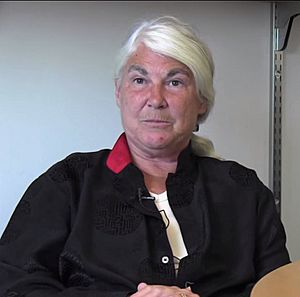Stephanie Seneff facts for kids
Quick facts for kids
Stephanie Seneff
|
|
|---|---|

Seneff in 2014
|
|
| Born | April 20, 1948 |
| Nationality | American |
| Alma mater | Massachusetts Institute of Technology (BS, MS, PhD) |
| Spouse(s) | Victor Zue |
| Scientific career | |
| Fields | Computer science |
| Institutions | Massachusetts Institute of Technology |
| Thesis | Pitch and spectral analysis of speech based on an auditory synchrony model (1985) |
| Doctoral advisor | Kenneth N. Stevens |
Stephanie Seneff, born on April 20, 1948, is an American computer scientist. She is also known for her views on vaccines. She works as a senior research scientist at the Massachusetts Institute of Technology (MIT).
Early in her career, her research at MIT focused on how humans and computers interact. She also worked on algorithms for understanding language and recognizing speech. Since 2011, she has published papers on biology and medical topics. These articles have caused "heated objections from experts" in many fields.
Contents
Her Work and Studies
Education and Early Research
Stephanie Seneff studied at the Massachusetts Institute of Technology (MIT). She earned her first degree in biophysics in 1968. Later, she received master's and engineering degrees in electrical engineering in 1980. She completed her doctoral degree (PhD) in computer science and electrical engineering in 1985.
She is a senior research scientist at MIT's Computer Science and Artificial Intelligence Laboratory (CSAIL). Her early work focused on using computer models to improve how humans and computers communicate. This included studying the human auditory system. In 2012, she was recognized for her work on human-computer systems. She is married to MIT professor Victor Zue.
Research on Health Topics
Starting in 2011, Seneff began publishing articles about biology and medicine. These papers appeared in journals that are easy to access online. Her work in this area has made her a "controversial figure" among scientists. Experts have strongly disagreed with many of her ideas.
Glyphosate and Health
In 2013, she co-wrote a paper linking the herbicide glyphosate to many diseases. These included cancer and disorders like autism. Other news outlets republished the study's findings without questioning them. However, experts like Jerry Steiner from Monsanto stated that glyphosate has been studied extensively. He said it has a very safe history.
Seneff also claimed that glyphosate is a major cause of autism. She suggested that by 2025, half of all children born would be diagnosed with autism. This claim has been widely criticized. Many scientific reviews show that the rise in autism rates is due to better ways of diagnosing it. Studies have found little evidence linking glyphosate to developmental problems.
Views on Vaccines
After the COVID-19 pandemic, Seneff published articles about supposed vaccine side effects. In 2022, she co-authored a paper about the effects of SARS-CoV-2 mRNA vaccinations. This paper was published in a peer-reviewed journal. However, many scientists asked for the paper to be removed. They said it contained inaccuracies and claims not based on evidence. The journal's editors did not remove the paper. Instead, they published a letter from the concerned scientists.
Seneff and her MIT colleagues have also published on the health effects of fat and cholesterol. Based on this work, Seneff claimed that Americans suffer from a lack of cholesterol. This is different from the common belief that too much cholesterol is bad.
Anti-Vaccine Journal Work
Seneff is an editor for a journal called International Journal of Vaccine Theory, Practice, and Research (IJVTPR). This journal is known for spreading incorrect information about COVID-19 vaccines. In May 2021, Seneff published a paper in this journal. The paper discussed possible unintended effects of mRNA vaccines.
How Scientists Responded
Many scientists and experts have criticized Seneff's work. Clinical neurologist Steven Novella said her papers often assume that if two things happen together, one causes the other. He noted that she mostly publishes ideas and gives talks. She has not created much new scientific data.
Other experts, like chemist Derek Lowe and library scientist Jeffrey Beall, have also criticized her. They said she often misrepresents the findings of other researchers. They also pointed out that some journals she publishes in have a history of publishing studies without strong scientific merit.
A 2017 review by researchers from King's College London looked at Seneff's claims about glyphosate. They called her claims "unsubstantiated theories" or "simply incorrect." Michael Hansen, a senior scientist at Consumers Union, described Seneff's glyphosate claims as "nutty" and "dangerous."

